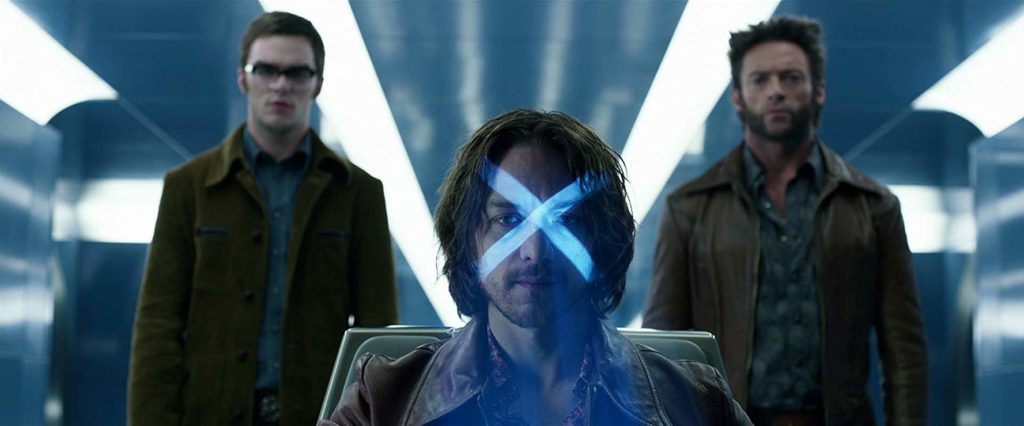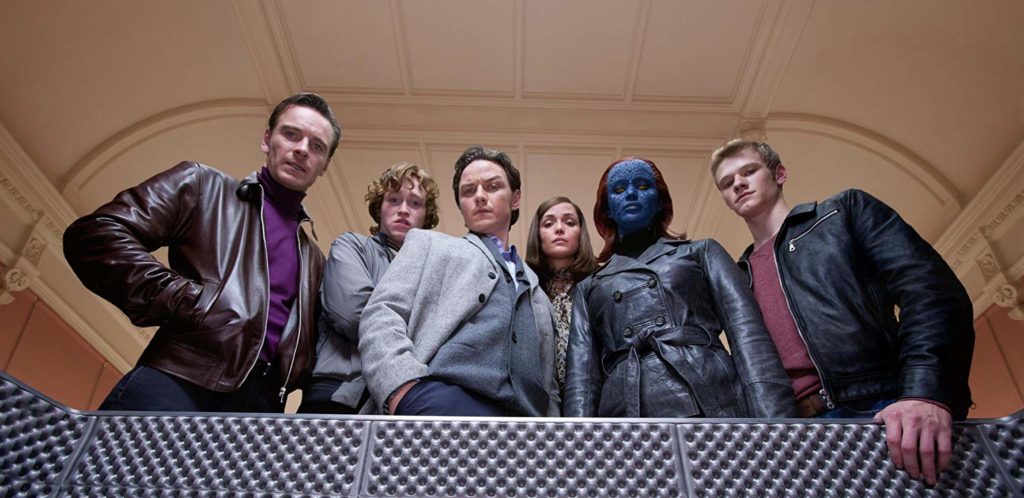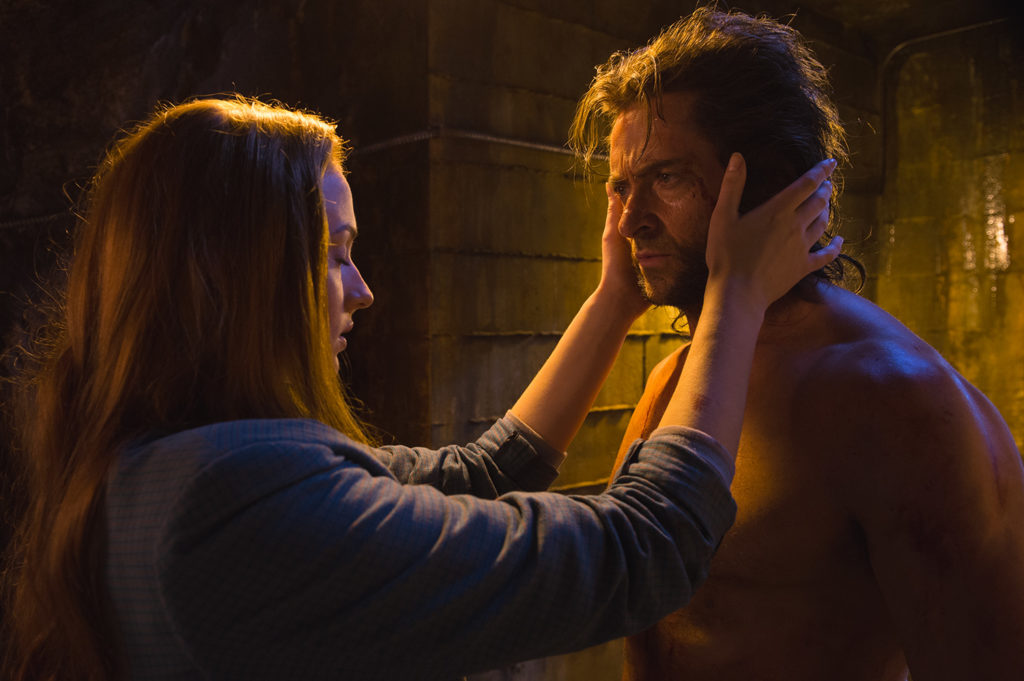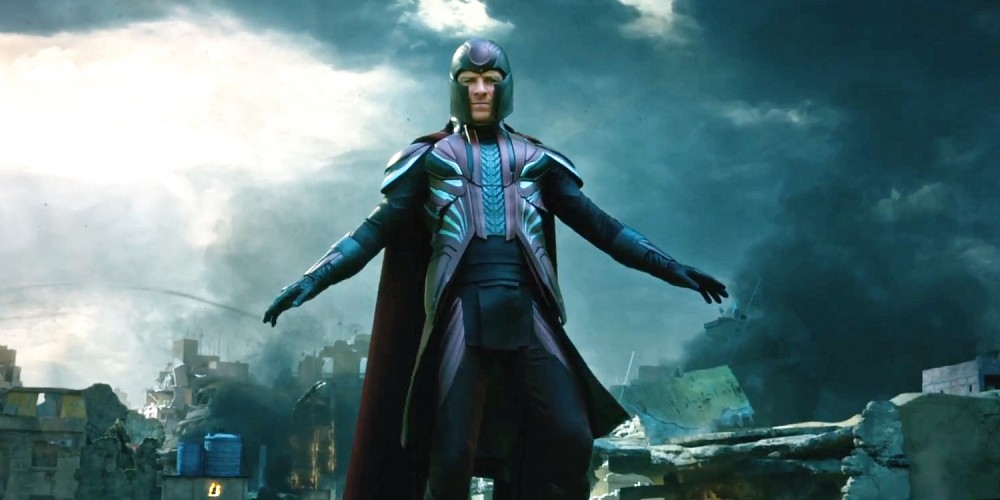If previous X-films favoured an insular narrative that delved into characterisation and the developing lives of the X-men, the ‘prequel trilogy’ is concerned more with examining the societal, political, and historical implications of mutants’ existence. As the franchise had done with Wolverine’s films following The Last Stand (2006), the next installment also went back in time to examine Xavier and Magneto’s origins in X-Men: First Class (2011), putting together a new cast for a series of period-pieces, all ostensibly set before the first X-Men (2000).
These prequels rejuvenated the franchise, bringing a new vision and tone to the films (though they are still weighed down by certain of the original films’ elements, preventing a clean break) and were able to expand beyond the rather insular first trilogy by incorporating comic-book elements like the Hellfire Club, robotic Sentinels, and Apocalypse. Here the X-films attempted to evolve, to showcase the colourful superheroics so long neglected in favour of muted social commentary. It seems that in order to move forwards, they had to go back.

Such steps are confidently taken by First Class, injecting the core commentary of the X-films with the energetic spark of the 60s. It reuses the original X-Men’s opening to again show Eric Lehnsherr/Magneto (now played by Michael Fassbender) in Auschwitz, and his mother’s murder. First Class then shows the Charles Xavier’s childhood (now James McAvoy), as he invites young runaway Raven/Mystique (Jennifer Lawrence) to live at his manor house. The two opening flashbacks are about dualities: they not only show both fidelity to, and separation from the original films (Xavier and Mystique were never mentioned together in the original trilogy), they also explore the destruction and creation of family, the rage of isolation and joy of community.
Time leaps forward, which sees Charles using his powers to shamelessly flirt in Oxford pubs and wielding his high family name, while Eric hunts Nazis in Argentinian bars, seeking revenge for all his people have endured. In his search for Sebastian Shaw (Kevin Bacon), the former Nazi doctor who murdered his mother, he meets Charles, and the two eventually team up to hunt Shaw and his Hellfire Club, and form the first group of X-Men. Despite their deep affinity for one another, the two have fundamentally different ideological outlooks, and Mystique becomes caught in between, torn between standing proud in her blue skin or using her powers to blend in.
Rather than attempt to replicate the weary gravitas of Ian McKellen and Patrick Stewart, Fassbender and McAvoy choose instead to bring a youthful conviction to their incarnations, and their relationship is what forms the foundation of this new trilogy. Fassbender has a fierce intensity that makes Eric determined and angry, and McAvoy brings an earnest empathy to his role as he tries to lead Eric down a different path. Their dynamic development refreshes the whole franchise, with Matthew Vaughn bringing an appropriate groove and vibrancy to the 60s era setting.

Indeed, one scene where Eric and Charles share a bed while recruiting mutant stripper Angel (Zoë Kravitz) oozes more sly sexuality than the whole original trilogy. First Class is also far cornier than the other films, but this allows a significant departure from the dour tone of the originals, whilst maintaining the social commentary of prejudice and fear. History is not so easy to escape. Magneto ends up adopting Shaw’s rhetoric of a mutant Master Race (and his helmet), while a now-paralysed Xavier opens his home to young mutants. In First Class it seems the past defines us, and that history is inevitable.
Such sentiments are directly contradicted by X-Men: Days of Future Past (2014), which is not only an adaptation of a classic comics storyline, but a sequel to both First Class and the original trilogy, both timelines crossing over as Wolverine (Hugh Jackman) is sent back to 1973 to prevent the post-apocalyptic future. Amid the ending of the Vietnam War, Wolverine must convince both Eric and Charles to help him stop Mystique from murdering military scientist Bolivar Trask (Peter Dinklage). He tells them that trying to kill him to quash his hatred will only amplify his message and ensure the funding of his mutant-hunting Sentinels. As Wolverine forces Xavier out of the mansion he’s stayed hidden away in, as the Professor had done for him in X-Men, they begin their attempts to guide the currents of history down a different path.
While Days of Future Past asserts that history is changeable, the returning Bryan Singer attaches the tone and cast of his original X-films to these new instalments, even if most of the recurring characters are cameos being brutally fought in the far-future. The prequels become imbued with the weight of the ‘future’ films, although also impaired by the same issues that affected those installments – including an occasionally overbearing and gloomy tone. Additionally, certain elements (like Professor X’s resurrection after The Last Stand, or the new time-travel powers of Kitty Pryde (Ellen Page) are left simply unexplained. Days of Future Past is often unable to balance its self-seriousness with historical fun, so while Quicksilver (Evan Peters) is introduced for a memorable slow-motion fight scene during Magneto’s prison break, he is then quickly abandoned.

Similarly, Magneto’s imprisonment is revealed to be from allegedly assassinating JFK – until Magneto explains he was trying to protect the President, who was really a mutant. Such goofy historical fiction is quickly forgotten, with Days of Future Past a solid and unique entry to the franchise, elevated by its dedicated central cast, and ability to transcend time-frames. Days of Future Past is essential to undo the deaths suffered in The Last Stand (a tease that is ultimately meaningless), and change the destiny of the X-films. The stage was set for a new generation of mutants, whose future is entirely in their hands.
In X-Men: Apocalypse, Xavier’s school is fully functioning for the first time since The Last Stand, effectively creating another origin story for the ‘core’ X-Men team, including young Cyclops (Tye Sheridan) and Jean Grey (Sophie Turner), as they face off against the reawakened ancient-Egyptian mutant En Sabah Nur/Apocalypse (Oscar Isaac). First Class and Days of Future Past both offered commentary on the past, albeit contradictory statements, but Apocalypse is focused on the destruction of the future, Apocalypse proposing the destroy the old world to create a new one. Mystique similarly tells the new recruits to forget everything they once knew, in order to embrace the changing world.
Yet despite its message, Apocalypse seems to be circling a familiar holding pattern rather than paving a new direction, as Apocalypse’s own ‘new world order’ sounding very similar to Sebastian Shaw’s from First Class, or Magneto’s central principles, who yet again loses his family in this film. Other repetitions include another Quicksilver slow-motion rescue (now so extended he becomes ridiculously overpowered), another diversion to a Weapon X facility (meaning Wolverine has appeared in every one of the X-films), and another decade-long time-jump, with none of the main cast noticeably aging. The X-films’ underlying principle of social commentary has now become outweighed by its bombastic CGI, including a scene where an angry Magneto demolishes Auschwitz. Such a scene should at least be memorable, but instead remains a surprising footnote within a dull installation, the flavour here drained from the series. Apocalypse sees the X-men settle into familiar routine, and while talk of destroying the past is all very well, it’s another thing to build something new in its place.

It appears that with Dark Phoenix, the X-films have found an appropriately passable finale. But while Apocalypse saw them run out of steam, the X-films still revitalised the superhero genre when they first appeared, establishing a grounded team of gifted individuals struggling to find acceptance in the world, as much as to save it. By the end, the X-films assimilated into the mainstream, and in doing so turned away from the unique style of the original films, even if still hampered by their dull costume-design – trading black leather for black riot-gear. Similarly, they never quite became the ensemble pieces they had the potential to become, instead focusing upon a single character’s view of the world around them. Ultimately, the X-films were overtaken by stronger species of superhero films, ones that were ready to fully embrace their comic-book origins; and thus the X-films were brought to extinction. But while they lasted, as flawed and outdated as they were, these films stood out as the strange exception to the genre’s other entries. They were original mutations that were doomed to become stuck in their own sagas, while pushing other franchises to evolve.
Check out parts I and II of our retrospective series on the X-films.
